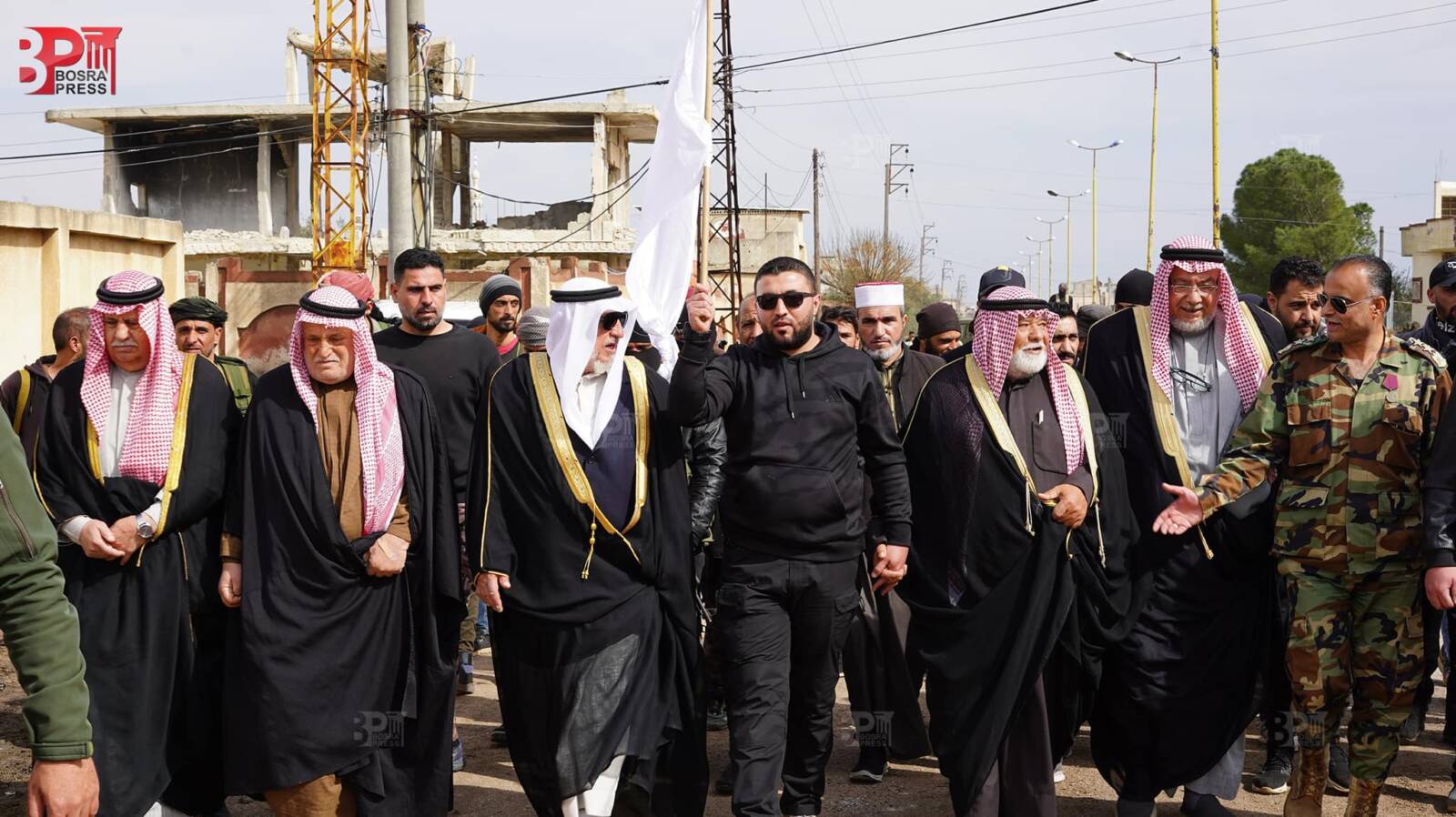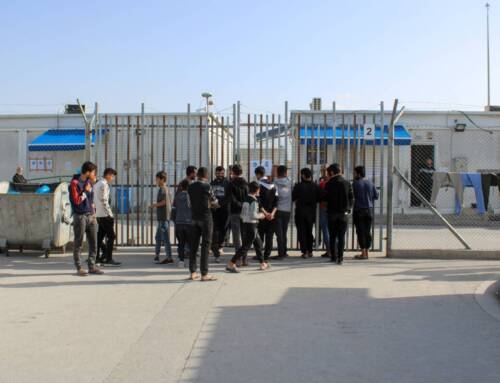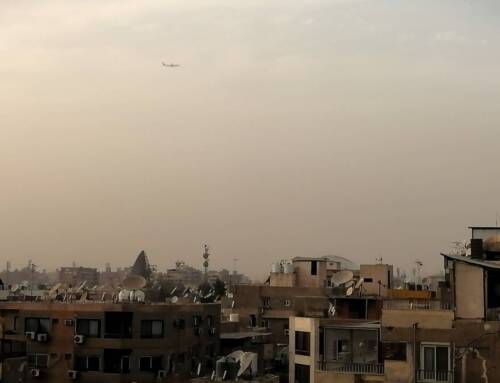Daraa residents turn to clan reconciliation over the court system
People in Syria’s southern Houran region have long turned to clan reconciliation processes to resolve thorny disputes. The practice increased after 2011, and peaked over the past three years, with residents choosing the clans over the courts with the encouragement of regime legal representatives.
4 April 2024
PARIS — Abu Zaki al-Zoubi and a group of clan notables in Syria’s southern Houran region are on the verge of ending a years-long dispute and blood feud between three families in the western Daraa city of Tafas that has left more than 20 people dead.
The work is part of efforts by al-Zoubi, 60, a notable of the al-Zoubi clan in western Daraa, and other clan leaders to “make peace between people and solve clan disputes,” he told Syria Direct. It is a task that occupies much of his day. Al-Zoubi is part of an unofficial reconciliation committee made up of clan notables, community leaders (mukhtars), clerics and jurists.
Like other clan societies, residents of Syria’s Houran—an area covering much of Daraa province—often turns to the clan solution, or clan reconciliation process (sulh), for solutions. This is particularly true in complicated cases, such as murders and crimes committed under the pretext of honor.
Since 2011, however, the area has seen an increase in reliance on the clan solution, peaking in the past three years as people turn to it over Syrian regime-affiliated courts, three local clan sources told Syria Direct. Regime representatives in Daraa also encourage people to solve their problems through the clans, they added.
On March 9, family and clan leaders in western Daraa’s towns and villages published a signed statement declaring the Sharia Committee in the Western Region—a body that oversees clan reconciliation processes—had a mandate to judicially administer the area. The body was authorized, they wrote, “to dispose of judicial matters, and it has the right to summon or bring any wanted individual from the people of the mentioned villages.”
Since the start of 2023, Daraa province has seen 11 clan reconciliations related to murder cases alone, Syria Direct found.
Two of them were concluded in Daraa province in mid-February, overseen by notables, sheikhs and clerics alongside the commanders of local armed groups. The reconciliations resolved murder cases—one in the northern Daraa town of Mahajja in the second half of 2023, and one in the western city of Tafas at the end of the same year.
Clans take the place of the state
The role of clan notables in the Houran’s society has grown in recent years. In the “absence of the state’s role,” there is “an increased clan role, especially in the western region of Daraa,” al-Zoubi said.
Since 2011, only “a small portion of cases went towards the regime, while 99 percent of them have been resolved through the clans,” al-Zoubi contended. “Everything that affects our daily lives is resolved through the clans, except those related to real estate and land matters.”
“With Syrian civil law not being applied, and the difficulty of a perpetrator being arrested by relevant state agencies, clan reconciliation has become the only option available to people,” another clan notable in Daraa told Syria Direct.
“People prefer the clan rulings,” Abu Khaled, a notable from the northern Daraa city of Jassim, added. “They do not take a long time, compared to the regime’s courts.” He also pointed to “the corruption of the regime judiciary, in terms of bribes, and the corruption and inexperience of the judges, not to mention that some of them have a military, not legal, background.”
“With Syrian civil law not being applied, and the difficulty of a perpetrator being arrested by relevant state agencies, clan reconciliation has become the only option available to people.”
Clan reconciliation committees are “formed with the consent of both sides, from well-known and mutually accepted figures, and the decision is binding for the parties to the dispute,” Abu Khaled explained. “Every family and clan has a sheikh, a guardian or a senior person who guarantees [the ruling] and obliges them to abide by the committee’s decisions.”
Aside from “judicial corruption, which pushes people towards the clan solution since it is fair to both sides,” it is available to “people wanted by the regime on either side of the dispute,” Abu Hayyan, a notable from the northern Daraa countryside, added. “Their opposition or activity against it means they are in danger if they enter a state institution.”
Trust in clan reconciliation processes is boosted by it being an important pillar of society in the Houran even before the March 2011 revolution and gets to the root of problems, notables told Syria Direct.
As Abu Khaled sees it from Jassim, formal court rulings cannot resolve issues of blood and honor. “Even if the court makes a judicial decision, the dispute only ends through clan reconciliation. The judiciary knows its ruling is pointless without a clan resolution resulting in what is known as the clan deed [of reconciliation, sak sulh ashairi] between the disputing parties,” he said.
“Even if the court makes a judicial decision, the dispute only ends through clan reconciliation.”
“The state courts do not finish the problem. They rule in favor of one party over another. The result is that the issue remains open, tribally, for years. Clan reconciliation, meanwhile, addresses the roots of the problem with the acceptance of both parties,” Abu Khaled added.
“These are the customs of the Houran. Clan reconciliation was and remains the foundation,” one notable from Daraa al-Balad said. “Even when there was active law, before the revolution, the judiciary did not dismiss [clan] reconciliation.” Rather, “the clan solution is stronger than the state judiciary, because the clan is stronger, and there are clan sponsors to implement the reconciliation,” he said. Going against a deed of reconciliation is difficult, “because vetoing it means cutting the face [taqtia al-wajh], which has grave consequences in clan society.”
“The clan solution is stronger than the state judiciary, because the clan is stronger”
“Cutting the face” in Arab tribal customary law, essentially refers to breaking the agreement. When resolving disputes through a clan, a reconciliation committee (jaha) is chosen. The committee requests a grace period (atwa) to be granted from the victim’s relatives to the relatives of the accused. If they consent, the relatives of the accused become “in the face of the sheikh of the jaha,” or under his protection. Breaking the agreement, then, means “cutting the sheikh’s face.”
Local factions raise the white flag
On many occasions, the deputy commander of the 8th Brigade, Ali al-Miqdad, known as Ali Bash, has appeared among sheikhs and clan notables, carrying the white flag of reconciliation during a clan reconciliation process in the Houran.
The 8th Brigade is a military group, led by former Syrian opposition commander Ahmad al-Awda, affiliated with Syrian military intelligence. The brigade has sponsored a number of clan reconciliations in the Houran in recent years, serving as a guarantor in some to implement the terms of the peace.
The Central Committee in the western Daraa countryside—one of a number of local bodies formed following the 2018 settlement to administer the area, negotiate with the regime and oversee a military force made up of former opposition factions—formed a Sharia Committee at the start of 2023. The body, made up of clerics and notables in western Daraa, is tasked with making peace between people and conducting reconciliation processes with support from the Central Committee’s factions.
This situation points to an overlap between the clans and local armed groups, in which clan affiliations and regionalism are deeply embedded. This is particularly true when these groups play an active role in administering the area where they are based, such as Busra al-Sham, Tafas and Daraa al-Balad.
“The 8th Brigade is a fundamental part of the social fabric in the south, and has always been a key party protecting civil peace and controlling security by virtue of the community’s trust in it,” one 8th Brigade commander told Syria Direct. He stressed the brigade intervenes in local conflicts “as needed” to “break up conflicts and prevent them from spreading, given the uncontrolled weapons” in the area. At times, it intervenes “at people’s request,” he added.
“People prefer the 8th Brigade’s intervention because of the feebleness of government bodies and their inability to resolve these conflicts,” the commander said.
“If the issue concerns the factions and commanders, the sharia committees and the clans are unfair and biased.”
In the western Daraa countryside, the Sharia Committee oversees clan reconciliation processes alongside the 8th Brigade. One recent case involved a dispute at the beginning of March between the al-Kafari family and a local military group working for Syrian military security.
While the Sharia Committee notes that it is independent, two sources told Syria Direct it works under the auspices of the Central Committee and its affiliated military groups.
“The committee includes six figures affiliated with the Central Committee, and its judgments are sometimes questionable,” one Tafas resident said on condition of anonymity for security reasons. “In more than one incident, its judgment was not welcomed by the opposing parties,” including the al-Kafari dispute.
Abu Abdullah, a cleric in western Daraa, agreed. “If the issue concerns the factions and commanders, the sharia committees and the clans are unfair and biased.” This also includes areas controlled by the 8th Brigade, in his view.
The trouble with the clan solution
Abu Abdulhaq, a cleric from Inkhil, has helped resolve many disputes between people in his city. In his experience, “people resort to the clan solution to avoid paying some compensation, including as relates to what is known as fawrat al-dam following any murder,” he explained to Syria Direct.
Fawrat al-dam, literally “outburst of blood,” refers to actions taken by relatives of a victim against the accused perpetrator and his family before a truce or reconciliation. This could include burning their property or committing other acts against them.
Under Islamic law, in murder cases the victim’s family is awarded blood money (diyya). However, if they retaliate against the family of the perpetrator, as in fawrat al-dam, they must “pay the costs of the properties they burned,” Abu Abdulhaq said, emphasizing that “in Islamic law, there is no fawrat al-dam.” As a result, “some turn to the clan solution to avoid paying for damages resulting from it, which are dropped” in the clan reconciliation process.
The clan solution also includes jalwa, a form of banishment in which the perpetrator of a crime and certain family members are required to move outside a distance agreed upon by parties to the dispute. This also runs contrary to Islamic law, Abu Abdulhaq said. “Victims’ families prefer the clan solution to access demands that go against the sharia and Syrian law,” he said.
“The police station can’t arrest anyone. The clan has become stronger and more capable of ending problems, and people solve things with armed force.”
In response, al-Zoubi said “jalwa is for a certain, agreed-upon period, which is in the public interest, and its duration varies according to the type and heinousness of the crime. It is around a year or more.”
Despite his reservations, Abu Abdulhaq has participated in multiple clan reconciliations that included both jalwa and fawrat al-dam “because of the victim’s family’s preference, and our desire to avoid bloodshed because of the absence of the force of law,” he said.
“Our basic problem in Inkhil, for example, is the absence of state power. The police station can’t arrest anyone. The clan has become stronger and more capable of ending problems, and people solve things with armed force.”
From a legal perspective, “any clan reconciliation not documented by a written deed signed by the disputing parties is not legally valid, but a reconciliation that is documented and signed is effective and taken into account” by the court system, Adnan al-Masalma, a lawyer and Daraa city notable, told Syria Direct.
“The clan solution does not include the public interest, as it only provides for individual rights,” al-Masalma added. So waiving one’s personal right in cases of murder and major crimes “does not waive the public interest, legally. Rather, it waives the civil right and compensation. The public interest remains, but the perpetrator benefits through clan reconciliation by reducing the penalty.”
Clan reconciliation is based on consent and the rights of aggrieved parties, al-Masalma said. It also “simplifies the bureaucratic procedures that hinder reaching a solution, and speeds up the litigation process.” However, it lacks “a measure such as preventive detention and [consideration of] the public’s rights, which require harsh and severe penalties for certain crimes that harm society and significantly impact people,” he added. These “have judicially severe penalties despite reconciliation.”
“The Houran is living in a state of clan consensus, and people are turning to the clan solution to save time and for sensible people and people of authority to intervene because of the large number of killings and the resulting house-burnings and evacuation of the perpetrator’s relatives from the area,” al-Masalma said. The state “does not intervene, and is unable to remedy the causes or investigate and arrest perpetrators and accomplices in these acts.”
In some cases, “regime courts intervene and issue rulings in absentia against the criminal, but they cannot execute the sentences,” the notable from Daraa al-Balad said. At the moment, “it appears the regime judiciary is going along with [clan reconciliations] and neglecting the public interest,” he added. “Perpetrators are usually not in prison, and if they are, the judge is satisfied with time served if personal rights are waived and there is a clan reconciliation.”
“There is agreement from the attorney general in Daraa…to resolve cases through the clans for many reasons, including the shortage of judges and the judiciary’s inability to execute warrants and judgements.”
The Syrian judiciary encourages community leaders to resolve problems outside the courts “to relieve the case burden, given the current shortage of judges,” the notable said. “The attorney general in Daraa is flexible in resolving cases in the Houran, to ease his burden.”
Lawyer al-Masalma confirmed that, noting “there is agreement from the attorney general in Daraa to facilitate matters to resolve cases through the clans for many reasons, including the shortage of judges and the judiciary’s inability to execute warrants and judgments issued in cases that do reach the courts because the police cannot do their work in places that are not directly controlled by the regime,” as in the case of southern Syria.
After a clan deed of reconciliation is signed, “the public interest remains outstanding until the criminal turns himself in to the regime, or waits to be covered by a presidential general amnesty, in the event the accused is not arrested,” al-Zoubi said.
As people increasingly rely on the clan solution, community and clan leaders in the Houran intend to call soon for an initiative to limit the negative repercussions of fawrat al-dam and jalwa.
They aim to “reduce cases of revenge and the unjust burning of homes after a crime is committed, by preventing the victim’s relatives from retaliating in kind against the perpetrator’s relatives” and destroying their property, al-Zoubi said. This could be done, he said, by “holding all those who attack a person’s property responsible for it, and not using fawrat al-dam as an excuse, and for jalwa to be for the perpetrator alone, not his relatives or clan.”
This report was originally published in Arabic and translated into English by Mateo Nelson.







